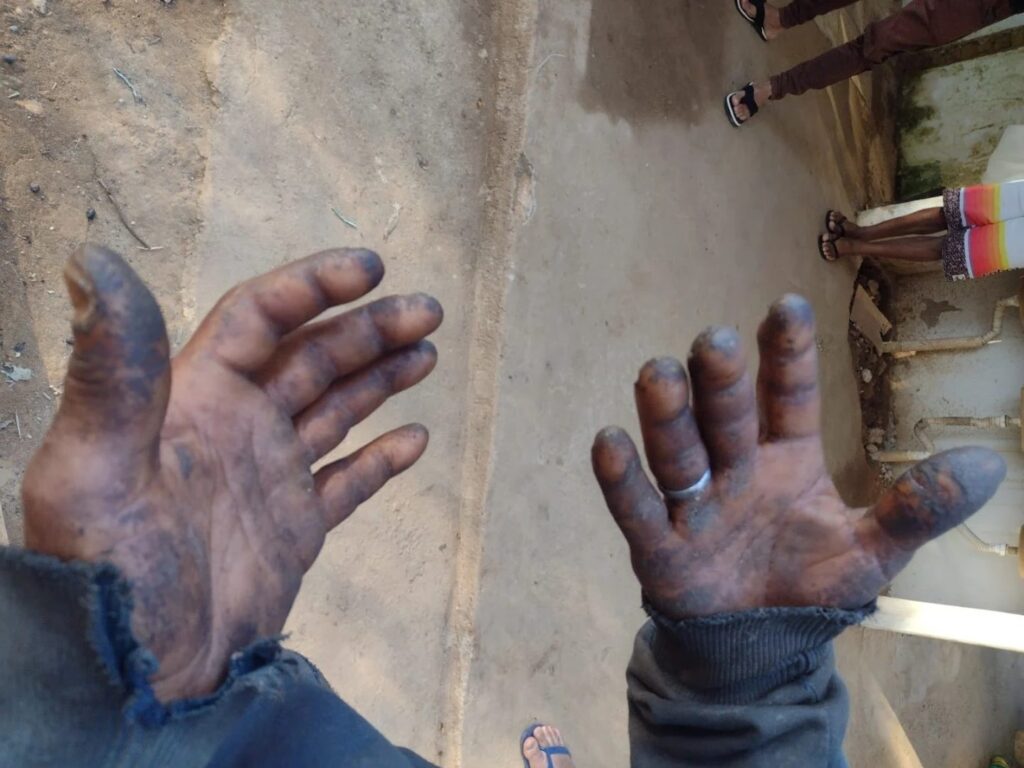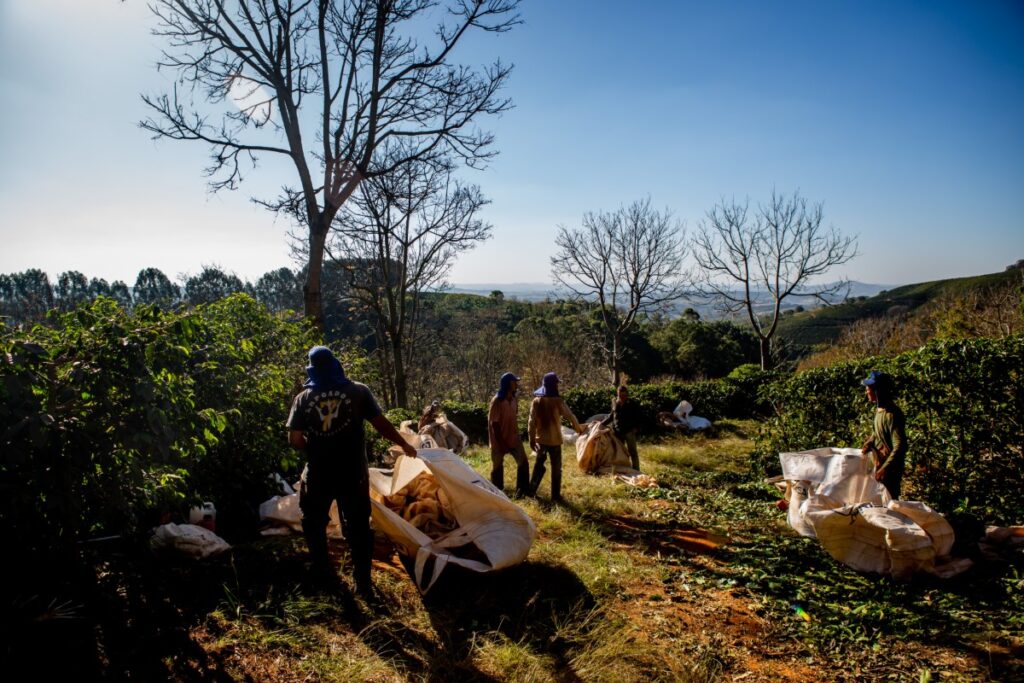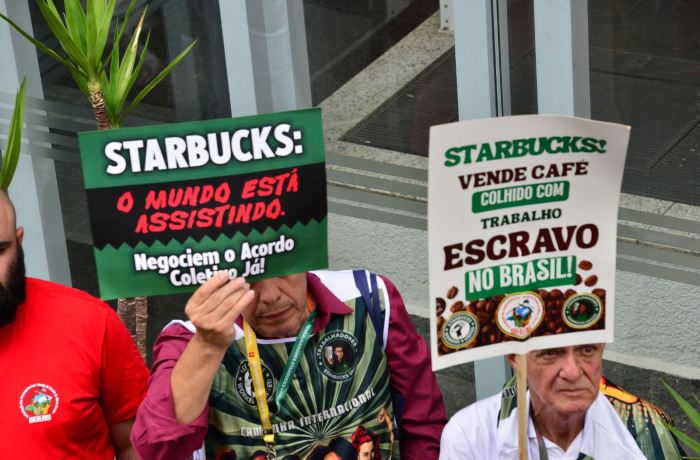AT FAZENDA FLORESTA, in Heliodora, southern Minas Gerais, 20 workers were rescued from conditions analogous to slavery in August 2021. New evidence obtained by Repórter Brasil indicates, however, that even after the slave-labor case, the property remained certified by C.A.F.E. Practices, the Starbucks coffee chain’s program for verifying good practices.
This is the first time evidence has come to light that Starbucks’ seal was maintained for a Brazilian farm after a slave-labor case. The story is detailed in the report “STARBUCKS: New cases of modern slavery involving the multinational’s coffee suppliers,” published on Monday (27) by Repórter Brasil.
According to the inspection report by auditors from Brazil’s Ministry of Labor and Employment (MTE), the victims at Fazenda Floresta suffered illegal deductions from their wages and slept in dormitories without ceiling lining and with gaps in the walls. One of the rooms used by the group was next to an area with open sewage, according to the same document, which deemed the conditions imposed on the workforce degrading.
Due to the case, the owner of Fazenda Floresta, producer Guilherme Sodré Alckmin Júnior, was included in April 2023 on the government’s Dirty List of employers held responsible for slave labor. Inclusion occurs only after the right to defense in two administrative instances at the MTE.

Even after his inclusion on the Dirty List, however, the property remained certified by C.A.F.E. Practices. That is what the producer claims in an extrajudicial notice from October 2023, obtained by Repórter Brasil in August of this year. The document was attached to a lawsuit filed against the farmer by the Brazilian subsidiary of the European multinational Louis Dreyfus Company (LDC). In the notice, the producer’s legal counsel asserted that Fazenda Floresta then held C.A.F.E. Practices certification, valid until July 2024.
LDC is listed as a Starbucks coffee supplier. In the lawsuit, the company sought to terminate three coffee purchase-and-sale contracts signed with Alckmin Júnior in 2020 for delivery of 1,200 bags in subsequent harvests. Documents reviewed by the reporters indicated that the coffee delivered had to come from lots certified under the C.A.F.E. Practices program.
The termination request had two grounds: the employer’s inclusion on the Dirty List—which LDC said violated its Raw Material Supplier Code of Conduct—and Alckmin Júnior’s failure to deliver the product. According to the producer’s defense, the coffee was not delivered due to frost that struck the crop.
In a notice sent to the company, the farmer’s lawyers described the relationship with LDC as “fair, balanced, trustworthy and, above all, in good faith,” which resulted in Fazenda Floresta’s inclusion in the C.A.F.E. Practices certification program through the multinational’s intermediation. The defense also stressed that Fazenda Floresta had undergone several audits since 2018 and that “after the Ministry of Labor inspection in August 2021, verification visits by companies and certifiers were carried out, which found and documented compliance with the legislation,” the producer’s legal counsel said at the time.
Alckmin Júnior remained on the Dirty List at least until October 2024. He went to court to annul the slave-labor infraction notice and the resulting inclusion on the registry. He lost in both first and second instances and now awaits a final appeal before the Superior Labor Court.
Repórter Brasil sought comment from Alckmin Júnior through his lawyer, but the producer chose not to comment, stating that all pertinent information had already been provided to the courts.
LDC stated that it learned of the case in 2021 and confirmed that it carried out an inspection at the site at the time. It also said it suspended new purchases from the producer and, in 2023, terminated the contracts due to Alckmin Júnior’s inclusion on the Dirty List. The company said the farmer is not currently an LDC supplier.
Questioned by Repórter Brasil about the case—and presented with documents in which the producer claimed he remained in the program even after being placed on the Dirty List—Starbucks did not comment on the specific case, limiting itself to providing generic information about its coffee-sourcing responsibility policies in Brazil. The full response from Starbucks can be read here.
Slave labor on farms linked to a Starbucks supplier
The report published Monday by Repórter Brasil also highlights new slave-labor cases identified in the 2025 harvest involving farmers linked to one of Starbucks’ largest global suppliers in Brazil, Cooxupé (Regional Coffee Growers’ Cooperative of Guaxupé).
The largest Arabica coffee cooperative in Brazil, Cooxupé exported 80% of the coffee it received from its members in 2024. Starbucks is cited as one of the cooperative’s main clients abroad and appears on the list of coffee suppliers published by the U.S. company.
Information provided by the MTE to Repórter Brasil indicates that over the 2025 coffee harvest, which ended in September, 15 slave-labor cases were identified on Brazilian coffee farms. Of these, five involved coffee growers who are Cooxupé members.
In September, Repórter Brasil reported that a 12-year-old child, a 16-year-old teenager, and a 72-year-old elderly man were among the 81 workers rescued in cases involving producers linked to the cooperative, according to inspection reports and infraction notices describing the raids, reviewed by the reporters.

At the time of publication, Cooxupé stated that it had blocked the membership of the five producers. It also said that it “does not market coffee from properties that violate labor laws” and that all members must comply with the cooperative’s Code of Ethical Conduct and Integrity Program, “which expressly include compliance with the labor laws in force.”
Also at the time, Repórter Brasil asked Starbucks whether the five Cooxupé members caught using slave labor this year are or were part of its coffee-sourcing program. The company did not answer the question. Starbucks stated only that it buys coffee from “a small fraction” of farms belonging to Cooxupé members—and only from those verified through its C.A.F.E. Practices program, which, it says, includes “rigorous audits.”
Asked again by the reporters, Starbucks did not make specific comments regarding Cooxupé. The company said it “remains committed” to working with suppliers to advance labor practices and noted that, in Brazil, it maintains a Producer Support Center that offers training on social responsibility for coffee producers and suppliers concerning Brazilian labor law.
The company also said it continuously reviews and strengthens the C.A.F.E. Practices program and its due-diligence approach, working with organizations with “relevant expertise in remediation and implementation of recommendations, both at the supplier and farm levels.” Read Starbucks’ response in full here.
Do cooperatives “do everything within their power”?
Days after the story on the five Cooxupé members was published, a note signed by the president of the National Coffee Council, an organization representing the sector’s interests, argued that “cooperatives are not out in the field harvesting the crop” and that the hiring of workers is the responsibility of individual producers. “In other words, everything cooperatives can do is done to punish the cooperatives caught in such conditions,” said a part of the statement.
“That claim that they adopt every applicable practice does not hold up,” says Fernanda Drummond, an adviser to the Socio-Environmental Rights Defense program at the organization Conectas. In her view, companies like Starbucks and its suppliers should be more transparent about the coffee growers they do business with so that labor problems on farms can be monitored in dialogue with workers’ organizations and other civil-society actors.
“Neither ADERE nor various unions we work with in many municipalities have ever been consulted by cooperatives or certifiers about slave-labor cases in the sector,” says Jorge Ferreira dos Santos, coordinator of ADERE-MG (Articulação dos Empregados Rurais do Estado de Minas Gerais), an organization that receives reports of labor violations in the countryside and alerts the authorities.
According to Jorge dos Santos, cooperatives and companies should adopt a set of measures to promote better labor practices in coffee growing. These include, for example, encouraging collective bargaining agreements between rural unions and farmers’ representatives, providing technical assistance to producers on health and safety standards for the harvest, and offering accounting support for the formal hiring of labor.
Lawsuit in the United States
Starbucks’ relationship with slave-labor cases linked to Cooxupé is also cited in a lawsuit filed against the multinational in U.S. courts. The action, filed by the NGO International Rights Advocates (IRAdvocates) in April this year, asks that the company compensate eight migrant workers rescued from conditions analogous to slavery on coffee farms in Minas Gerais.
The lawsuit is based on the TVPRA (Trafficking Victims Protection Reauthorization Act), which allows companies headquartered or operating in the United States to be sued for crimes committed outside the country. “Defendant Starbucks had knowledge of the forced labor and trafficking violations of Cooxupé and its member farms,” IRAdvocates says in the filing.

One of the cases described occurred at the Córrego do Jacu and Paquera sites, in Juruaia (MG). Both sites were inspected on June 17, 2024. Six workers were rescued, including a teenager. At the time of the raid, Repórter Brasil reported that the producer cited for slave labor was a Cooxupé member.
A system “designed to fail”
“It is shocking to me that Starbucks continues to claim that they are fully complying with their own standards of C.A.F.E. Practices and their own Code of Conduct when the facts are clear that violations are common,” says Terrence Collingsworth, founder and executive director of IRAdvocates, commenting on the new cases of slave labor identified by Repórter Brasil among Cooxupé members.
“Starbucks was told over and over that it had these problems and that the problems were documented in very public ways. Yet, Starbucks did not repair its systems [for coffee purchasing] treating these cases of slavery as like random bad apples,” says Etelle Higonnet, founder and director of the NGO Coffee Watch.
For Higonnet, by maintaining these conditions in its coffee supply chain, Cooxupé, the C.A.F.E. Practices program, and Starbucks are “creating conditions for failure.”
Leia também

